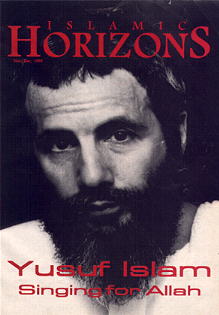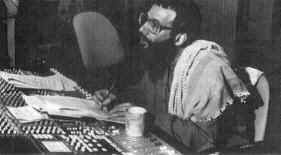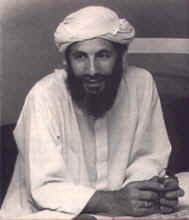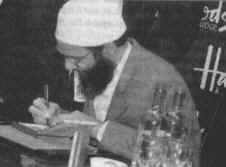This article comes courtesy of Aun1 aka A'isha Alnahar.
Islamic Horizons is a Publication of the Islamic Society of North America. This article
appeared as the cover story the November/December 1995 issue.
ALL SONGS ARE
FOR ALLAH ALONE

Written by
Omer Bin Abdullah
Like all his efforts, all
his songs are for Allah alone,says Yusuf Islam introducing his first recording venture
after 17 years of absence from the field.
The newest offering from
Yusuf Islam entitled "The Life of the Last Prophet" evolved out of his concern
to offer the non-Muslims some insight into the life of Prophet Muhammad (SAAS). Yusuf
Islam’s production was introduced at the 32nd Annual Convention of the Islamic
Society of North America (ISNA) that was held in Columbus, Ohio on Labor Day weekend
(Sept. 1-4). It was however officially launched on Sept. 5 at London’s
prestigious Harrods department store where eager crowds competed to get the new album
autographed by him.
Yusuf Islam who spent a
painstaking four years in researching material for the one hour presentation, says:
"For so long now, I think that there has been misinformation and gross confusion and
mystery surrounding the religion of Islam and particularly the life the Prophet (SAAS). He
has been depicted in such alien terms, as if he was from another planet, and yet he was
actually a descendent of Prophet Ibraham (AS), as Prophet Jesus (AS) was a descendent of
Ibrahim (AS). You see the Prophets all gather in Islam under one heading and that is
‘Prophethood.’ So a familiarity is necessary in order to know his real position
amongst the Prophets; I think every non-Muslim should study his life." He says that
his recorded biography is designed to make that study easier.

Today, Yusuf Islam points
out the people have access to the writings on Islam both from Muslims and non-Muslims.
"I am a Muslim trying to convey the message of Islam in English, the tongue with
which I was born. I think that this is important, and I will be conveying this to people
like me who didn’t know anything about Islam," he emphasizes.
The Islamic tradition,
Yusuf Islam says, is rich in the study of Seerah, which is actually what the biography of
the Prophet (SAAS) is called in Arabic. In fact, it is one of the greatest and most
important sciences in Islamic fiqh (jurisprudence).
To his dismay Yusuf Islam
found that despite this there was no actual material which he could pickup and give to a
non-Muslim and say, "Listen to this! It may explain something, a little bit about the
religion of Islam." It was this desire to make available such material that led Yusuf
Islam to spend over four years on the project. He says that it took him so long because he
was "always a bit of a perfectionist," and adds that "I haven’t
changed in that respect. I work very hard. When it comes to finishing a project I like it
to be as perfect as possible."
It was this search for
perfection and the love for the Prophet (SAAS) that led Yusuf Islam to consult scores of
references and consult with scholars in many parts of the world. He says, "I wrote to
them, sent them the text, it came back, I revised it, added to it.’ He points out
that this "process of checking and authentication, and finally compiling the whole
text before the recording, was quite a long one." Interestingly enough, Yusuf Islam
says, it did not take him that long to record the whole thing. ‘~I did it almost in
one take with one break for prayers and the thing was recorded, beams a satisfied Yusuf
Islam.
After completing the
recording, the stickler for perfection as he is, Yusuf Islam faced the challenge of
finding the "right voice" for the portions of the Qur’an that were to be
inserted. He knew that this was a very important aspect because for many people listening
to it, this will be the first time they will hear the verses of the Qur’an in Arabic.
This search took him to Egypt forYusuf Islam knew that one of the best reciters of the
Qur’ an come from that country. Here he found the voice he sought. He says Sheik
Muhammad Al Minayoui’s voice is absolutely perfect for the purpose.
 Yusuf Islam was
born to a Greek Cypriot and Swedish couple who lived near the heart of London’s
entertainment district on July 21, 1948, and unsurprisingly at 18 he recorded his first
music single. The young entertainer, Steven Demetre Georgiou adopted the stage name of Cat
Stevens and sold nearly 25 million copies of long playing records throughout the world
before giving up the world of pop music to serve Allah. Yusuf Islam was
born to a Greek Cypriot and Swedish couple who lived near the heart of London’s
entertainment district on July 21, 1948, and unsurprisingly at 18 he recorded his first
music single. The young entertainer, Steven Demetre Georgiou adopted the stage name of Cat
Stevens and sold nearly 25 million copies of long playing records throughout the world
before giving up the world of pop music to serve Allah.
Yusuf Islam, now a father
of five children, relates an interesting moment in his life that confronted him in
California. At the height of his singing career, he was visiting Malibu, the haunt of the
super rich near Los Angeles and decided to go out for a swim not knowing it was not the
suitable time to do so. Once in water, soon he found himself in trouble and realized that
he had no other help except to shout out loud: "0 God, if you save me, I’ll work
for you." At that moment a wave came from behind and pushed him forward to safety.
This made him realize that God existed and it was easy for him to comprehend the truth
when he read the Qur’ an that his brother had brought as a gift from Jerusalem.
The moment Yusuf Islam
opened the Qur’an, he realized that it was not "that foreign religion" that
he had thought it to be. He had so many times walked past the mosque in London’s
Regent Park without even noticing but finally the day arrived that he noticed a golden
dome arising out of the greenery, stepped inside and took the shahada.
Since then Yusuf Islam has
devoted his entire self to the service of Allah and kept his promise as only a very few
can.
The Most Important Story
"No story on earth is
so dramatic and important as that of the Final Prophet Muhammad, upon whom be blessings
and peace. For he was not simply the bearer of the Holy Qur’an, Allah’s
definitive statement of His Will for mankind: he was a perfect exemplar, whose every
action and word provided a model of the highest moral and spiritual excellence for
humanity."
Yusuf Islam says that it is
not surprising that from the earliest times the Muslims should have striven to
collect all the information
they could about his astounding career. Their priority, he says, was of course to record
his teachings on doctrine and practice. The best sources were those who had heard his
words directly, the Companions. Yusuf Islam points out that they were "assiduous in
preserving this precious heritage by passing it on to their own pupils, ‘the
Followers’."
Almost from the start,
stirring incidences from the Prophet’s (SAAS) life were told to popular audiences by
men called quassas - wandering narrators who preached in mosques or other public
places. The best-known was Wahd ibn Munabih (d. 110), who wrote down his information in a
book known as Kitab at Maghazi (The Book of Battles). Another early work came from
Urwa ibn al-Zubayr (d. 94), the learned son of a celebrated Companion, who had been
requested by Caliph Abd al-Malek to write down all he knew about the origins of Islam.
This tradition includes
eminent scholars like Muhammad ibn Ishaq (d. 151), author of Sirat Rasul Allah (The
Life-Story of God’s Messenger). Yusuf Islam says that Ibn Ishaq’s work, revised
and updated by Ibn Hisham, is noteworthy both for its wealth of detail and for placing the
Prophet Muhammad’s (SAAS) story within the context of world history. Another great
scholar drawing on Ibn Ishaq’s wisdom but also enriching readers with his own
sources, was Muhammad ibn Umar alWaqidi (d. 207).
Yusuf Islam’s own
"The Life of the Last Prophet" draws largely on the earliest sources, and
particularly on those of Jbn Hisham and al-Waqidi. He also referred to some of the
contemporary works. Introducing his work in London, Yusuf Islam told his hundreds of
admirers, "In the context of Islam, love should be connected to marriage."
That counts out his popular
hits like "Here Comes My Baby" and "The First Cut Is The Deepest".
Yusuf Islam, who ended his pop singing career 18 years ago, says that still acceptable are
songs such as "Peace Train", "On The Road" and the "Morning Has
Broken".
Yusuf Islam has been
careful in separating his spoken-word biography of the Prophet (SAAS) from the melodious
part of the CD and audio cassette set. The melodious part that contains two nasheeds or
praise for the Prophet (SAAS), the popular Tala’ at Badru ala yna, are on a
separate CD/ cassette. The only musical instrument allowed is percussion drums.
Yusuf Islam considers Tala’
at Badru alayna, which means "The White Moon Has Arisen Over Us," as
"one of the most important songs in the Muslim world" because that song was sung
when Prophet Muhammad (SAAS) entered the city of Madina after his migration from
persecution in Makkah. As he entered the city, the children rushed out singing this song.
Appropriately enough, Yusuf Islam went to Jordan to get it recorded by a children’s
choir.
The love for the Prophet
(SAAS) and Yusuf Islam’s urge to make this as precise as possible are evident from
every aspect of this monumental production.
The quality of the CD and
cassette production is impeccable and certainly matches the quality of any mainstream
production. The quality of digital mixdown results in extreme clarity in a hi-fl system.
"No story
on earth is so dramatic and important as that of the Final Prophet Muhammad, upon whom be
blessings and peace."
- Yusuf Islam
Islamic Horizons, Nov. I
Dec. 1995 |